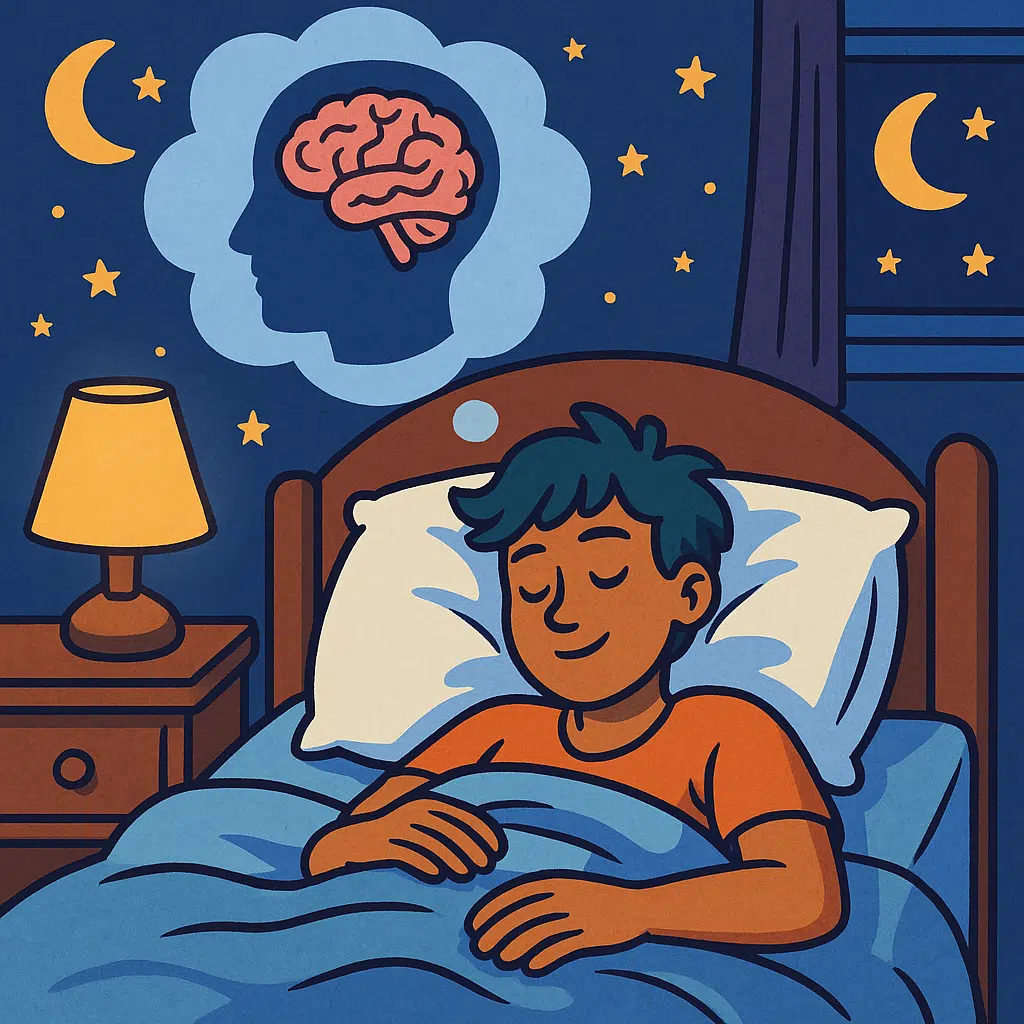The Role of Sleep in Improving Mental Health
Charlotte Stone August 8, 2025
Here’s the thing: the role of sleep in improving mental health isn’t just self‑care buzz—it’s a legit power move for your mood, creativity, and hustle. In 2025, we’re dropping the myth that sleep is optional for “grind culture” and instead, real talk: Sleep is a full-on productivity hack.

1. Why Sleep Isn’t Optional: The Mental Health Connection
Let’s be honest—skip your sleep, and you’re basically a moody, less‑creative, irritable mess. Science ditched subtle hints long ago: inadequate rest fuels stress, anxiety, depression, and it’s a vicious loop: poor mental health messes with sleep, and bad sleep worsens mental health.
Pressing insight: Sleep isn’t just rest—it’s the brain’s reset button. We’re talking emotional regulation, cognitive stamina, and keeping your inner worrywart at bay.
2. New 2025 Trends: Sleep Anxiety & Sleepmaxxing
Trending Talk: “Sleep Anxiety”
Welcome to 2025, where no, your phone isn’t the only anxiety-vessel—sleep anxiety is the new real. Worrying about whether you’ll sleep, obsessing over the quality… and yep, that anxiety itself keeps you awake. Real talk, ladies and gents: anxiety about sleep is a legit mental‑health challenge.
Sleepmaxxing: Not Gym Bro Energy, But Sleep Edition
Sleep like a builder, not a breaker. “Sleepmaxxing” means optimizing everything—from your bedtime routine to your noise level—for top-tier rest. It’s trending hard with Gen Z and millennials. Treat sleep like a flex, not something to shrug off.
3. Emerging Research & Innovations
Smart Watches That Spot Your Brain Overthinking
Wearables are leveled up. New AI models can spot spikes in anxiety or depression by tracking resting heart rate, sleep patterns, and steps—and flag when things get dicey. Imagine your watch pinging you: “Bro, let’s sleep,” not “new TikTok?”
LLM Therapy That Plans Your Sleep & Your Mood
Meet NeuroPal, a fancy AI that integrates sleep planning, CBT-style brain hacks, and even herbal advice to help with sleep, mood, and gut vibes. In trials with over 500 mood‑anxiety patients, folks improved sleep quality and mood big time—with better adherence than human therapists.
Internal Jet-Lag—Without the Flight
No, you didn’t mess up jet lag. “Internal jet‑lag” is when your circadian rhythms fall out of sync—even if you stayed home. It’s linked with depression, mood swings, bipolar issues. Fixing your internal clock could be the new therapy frontier.
4. Rock-Solid Science (Proof It Matters)
- Neurobiology & Brain Detox: Sleep clears out metabolic waste—like beta-amyloid—via your brain’s cleansing system. That’s protection against cognitive fog and future brain rustiness (like Alzheimer’s).
- Cognitive Performance: Sleep deprivation dulls memory, decision-making, and focus—thanks to impaired hippocampus and prefrontal cortex activity.
- Mood & Emotional Regulation: Lack of sleep ramps up negative emotions, irritability, and emotional fragility. Good sleep is your emotional armor.
- Optimal Hours? It’s Not “More is Always Better.” New findings suggest seven hours might be the sweet spot—oversleeping (like nine hours) could be less helpful, and consistency is everything.
5. Real-Life Gen Z Drama: Bold, Real, Sleep-Related
Gen Z struggles with sleep—thank screens, FOMO, and burnout. Here’s a real‑world wake-up: one 27-year-old’s sleep fell off the rails post‑pandemic—cue insomnia, social media, overthinking. Therapy, meds, and strict boundaries saved her—but only after she got serious about rest.
Yeah, the role of sleep in improving mental health is personal, not just clinical.
6. Practical Guide: Sleep Tricks That Actually Work
Your morning coffee-sipping, productivity-slaying self will thank you for these:
A. Build Routine (Consistency > Marathon Sleep)
- Stick to a sleep-wake time—even on weekends.
- Aim for that magic ~7 hours, but better: treat it like a muscle—gradual, consistent training.
B. Calm the Late-Night Brain
- Ban your phone 30–60 min before bed—yes, put it away.
- Blue-light filters or yellow-lens glasses? See ‘em trending hard in 2025 to defend your melatonin vibe.
C. Optimize Your Body Clock
- Use NeuroPal-style chronotherapy—get sunlight in AM; dim lights at night to prime your circadian rhythm.
- Track your internal clock with wearables. Tech’s your sidekick.
D. Reset the Overthinking Loop
- Can’t sleep? Get up. Journal, breathe, then try again. Stress about sleep = insomnia fuel.
- Bedtime procrastination (revenge staying up late) is real—it’s less self-care, more self-sabotage.
E. Add Strength—Exercise Counts
- Gentle resistance training (like weights or bands) twice a week can crush insomnia, especially in older adults. Helps mental health too.
F. Dream Smart (Kind of)
- Dream-time matters. REM sleep helps emotional processing. Try “dream engineering” – calming scent, quick reflection before bed. Might just boost creative and emotional clarity
G. Targeted Help for Neurodivergents
- ADHD + insomnia? It’s a ménage à trois of chaos. Treating sleep helps ADHD symptoms and livelihoods—worth prioritizing.
7. How Sleep Powers Your Career Mojo
- Sharper focus and decision-making = fewer mistakes, better strategies, less burnout.
- Mental resilience and emotional regulation = smoother office vibes, better communication, leadership cred.
- Creativity and problem-solving? Sleep’s the secret sauce.
- Health wins = less sick days, more energy—basically, sleep is workplace ROI
Investing in your sleep is investing in your career—and yeah, it’s nonnegotiable.
Wrap-Up: Your Sleep Is Your Superpower
The role of sleep in improving mental health? It’s foundational. From emerging tech (NeuroPal, wearables), to real-world stories of Gen Z battling insomnia, to solid neuroscience—sleep matters. Build habits, tune your rhythms, ditch screen-fueled overthinking, lift some weights, and treat sleep like your MVP.
Sleep isn’t just downtime—it’s when your brain consolidates memories, processes emotions, and resets neurotransmitter levels. Sleep-deprived brains show increased anxiety and decreased rational thinking. Modern sleep tech reveals the REM cycles and deep sleep phases that determine whether you wake up refreshed or exhausted.
Quality sleep enhances immune function, metabolism, and even how others perceive you. Well-rested people are more effective and attractive. Your sleep habits aren’t just personal—they’re professional assets.
You’re not lazy for prioritizing rest—you’re strategic, and it’s paying off in mood, productivity, creativity, and well-being. In a culture that celebrates sleep deprivation, choosing rest is strategic optimization, not opting out of success.
References
- Walker, M. (2017). Why We Sleep: Unlocking the Power of Sleep and Dreams. Scribner. https://www.sleepfoundation.org
- Harvard Medical School. (2019). The health hazards of insufficient sleep. Harvard Health Publishing. https://www.health.harvard.edu
- National Institute of Mental Health. (2021). Brain basics: Understanding sleep. U.S. Department of Health and Human Services. https://www.nimh.nih.gov/







